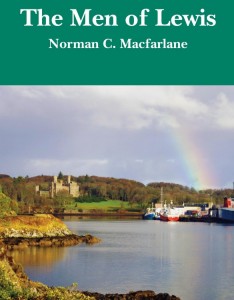 Review of The Men of Lewis, Norman C. Macfarlane, New edition published by William Murray, Lonemore, Dornoch IV25 3RW, pbk, 271 pp., £5 (+ £1.50 p&p), available from the publisher.
Review of The Men of Lewis, Norman C. Macfarlane, New edition published by William Murray, Lonemore, Dornoch IV25 3RW, pbk, 271 pp., £5 (+ £1.50 p&p), available from the publisher.
Recent years have seen a few classic volumes of Highland church history reprinted, and it is good to see this record of better days on the Isle of Lewis brought back into circulation. Originally published in 1924, the volume is valuable for its subject matter, as a record of the first couple of generations of evangelical Christians on Lewis, from the 1820s to the late nineteenth century. It offers encouragement in our day, by reminding what the Lord achieved by His reviving power in such a short period of time.
This said, the book has issues. Macfarlane professes his own unfitness to record the lives of these Men, and we have to agree. He was unsuited to do so by denominational affiliation, having chosen to align himself with the United Free Church in 1900 in opposition to the best of Lewis Christianity; and even more so on account of his support for the theological declension of the nineteenth century Free Church that found expression in the 1892 Declaratory Act, here lauded without discrimination (p.80). As John J Murray acknowledges in the Foreword, these erroneous views cause him to deprecate some of the most praiseworthy aspects of Lewis Christianity.
Furthermore, he adopts a hideous style of writing, a sort of ornate rotundity, mixing sentimentality with scraps of literary pretension. This author was not seasick, rather ‘Neptune transfixed me on the prongs of his trident’ (p.97). Such tiresome waffle is littered on every page of the volume. It is all the more inappropriate given the nature of Lewis Christians: to a man gritty, bluntly honest, plain-spoken. Macfarlane trills of the first three Evangelical converts: ‘Their heads, the Island has garlanded with immortelles’ (p.27). A rather better picture of a Man of Lewis is given by one of these, Murdo Macdonald, responding to the jocular question whether Westsiders would go to the same Heaven as ‘the enlightened people of Stornoway’, with the crushing rejoinder: ‘I think they will go to the same Hell’.
But if the reader would cheerfully take Knox’s walking stick to the stained glass windows of Macfarlane’s prose, the worth of the record cannot be denied. Without this book, much of the information here would have been irretrievably lost. Here we are brought to encounter Men who lived close to God, who experienced communion with Him, who knew His Word (often by memorization, for many were illiterate), and who loved His truth. There are solemn accounts here of supernatural insights into matters of life and death given to prayerful believers, and if some Highland Christians were perhaps too ready to see a spiritual hand in everything, as ‘Morachie Ban’ who thought the Devil had tipped over his creel of peats as he prayed (p.206), we must beware in our day of seeing the spiritual in nothing.
There is practical encouragement here, in Men who wrestled with severe doubts of God, of His Word, and of their own state. We see the comfort brought through fellowship, through the question meetings, through the service of faithful Gaelic schoolmasters, who so often read and expounded the Word for those far distant from godly ministry. We see the joy as at last, especially after the Disruption, neglected parishes came to know evangelical preaching for themselves, and how often this proved a message of life from the dead. Despite Macfarlane’s attempts to downplay it, we see the courage of the Men who took a stand in church controversy against the educated and the articulate, in favour of Scriptural truth over human innovation in doctrine and practice. It is a shame that Macfarlane takes his title very literally, and neglects the godly women of Lewis; their record is written in Heaven.
Highland church history is imperfectly recorded, but we are glad of what we have, and The Men of Lewis, though defective, is a precious volume for its subject matter. The number of Men recorded is impressive; the geographical spread is thorough. Here are familiar place-names: Swordale, Bayble, North Dell; but associated with nobler Christians than today we could muster. We commend The Men of Lewis to a present generation, especially those with links to the Island, that they will value the best of its history, and above all come to know for themselves the living religion here commemorated.


Leave a Reply